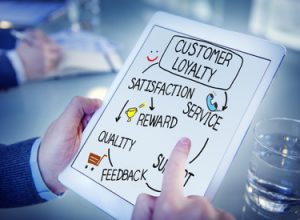by Ray Clopton, CEO of Wilbur
Are you considering launching a conventional customer loyalty program? You might want to reconsider. Offering a new customer loyalty program modeled after what national chains have used for years is like building a coal-fired power plant today. Why? What worked yesterday, won’t pass muster today. Our environment has changed with the time — and, even if you loved coal, there are much more cost-effective technologies available now.
Fostering true customer loyalty is fundamentally about how your customers feel when they walk into your business or make a purchase. Recognizing your customers’ needs can help you foster true customer loyalty that begins with awareness of your business environment.
So, what’s changed about today’s business environment? Consumers are more skeptical than ever. Recent events including the misuse of personal information by Facebook, a variety of corporate data breaches and a steady stream of unwanted emails have made most customers reluctant to share personal data.
According to a new Privacy Study from the Advertising Research Foundation (ARF), U.S. consumers are less likely to share personal information with companies, e.g., mailing address, email address, compared to the same survey conducted a year ago. The 1,100-person survey showed that only 54% of survey respondents said they would share their email address, a decrease from 61% last year.
Given this, asking weary consumers to sign up for another loyalty program is not an easy proposition. It also might have you rethinking the value and the liability of maintaining detailed, “big data” customer profiles that make your marketing efforts and related customer information an attractive target for hackers.
However, with the economy showing signs of weakness, consumers are becoming more value oriented and, if you approach them with appealing and easy to understand customer loyalty programs that make them feel good about your business, you can maximize the ROI on your marketing dollar.
With all of these factors in the backdrop — and keeping in mind potential sensitivities around giving out personal information — consider the following ideas for your loyalty program:
Use SMS Text Features.
Make it easy for even your most reluctant customers to join your loyalty program by implementing a text to join option. Offer a quick incentive to encourage customer participation and don’t forget to include text to join instructions on marketing collateral and signage.
Don’t Worry About an App.
Avoid developing a smart phone app unless there is a very compelling reason to have one. A recent Harris Poll survey reports that most Americans (58 percent) are less likely to join a loyalty program that requires them to download an app to access benefits. The most successful loyalty programs are focused on the overall experience, not the technology.
Actions speak louder than words.
Show your customers you respect their privacy by asking for only the information you need. We’ve seen success with requesting just a first name when opt-in text messaging is used instead of email marketing.
Reconsider whether you need email marketing.
Mobile promotions can be more cost effective than email marketing in many cases. Depending on your size, products/services offered and customer preferences, you might gain more bang for your buck by focusing on mobile offers. Reward messages sent by text can even be customized based on seasonality or new products and services.
Take an idea from the gift card industry and offer cash rewards.
National restaurant chains are known for their massive gift card sales around the holidays, e.g., “Get a free $10 gift card for every $50 you spend on gift cards.” They know that customers will consistently spend much more than the value of the gift card.
Consider a similar promotion, such as giving loyalty members $5/month, and the average customer is going to spend more than enough to make that up in profits. Plus, you know exactly how many customers redeemed their $5, so the ROI is easy to track.
Simplicity is key for your customers, and chances are you and your employees don’t have idle time to manage a complex and laborious email-oriented loyalty marketing oriented campaign. If your customers can understand the rules of your mobile loyalty program in 30 seconds or less—and sign up without feeling like they’re holding up the line at the POS—you are likely to engage and make the most of your marketing efforts.
With 25+ years of experience, Ray Clopton is a leading payments industry and technology expert and a featured speaker at conferences throughout North America, Europe and Asia. He serves at the CEO of Wilbur, an ultra-simple loyalty program designed specifically for small businesses. Ray is as devoted to building the small businesses his company serves as he is to the success of his own organization.
from Young Upstarts https://ift.tt/2Zk7Efg via website design phoenix



No comments:
Post a Comment